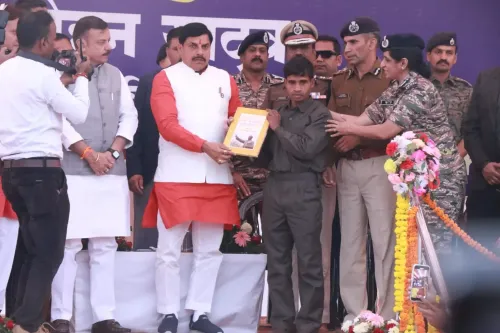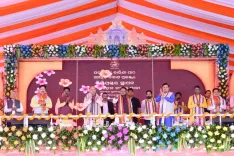How Does PM Modi Honor the Inspiring Legacy of Vajpayee?
Synopsis
Key Takeaways
- Vajpayee's leadership significantly influenced India's political and economic landscape.
- He was the first Prime Minister to win two consecutive terms since Nehru.
- His commitment to democratic ideals remains a guiding force for current and future leaders.
- Vajpayee's legacy continues to inspire a vision of a developed India.
- His life exemplifies dedication to public service and national development.
New Delhi, Aug 16 (NationPress) Prime Minister Narendra Modi on Saturday commemorated the late Atal Bihari Vajpayee on his death anniversary, praising the legendary statesman's unwavering commitment to India's advancement, which continues to motivate citizens in their pursuit of a 'Viksit Bharat'.
Born on December 25, 1924, in Gwalior, Madhya Pradesh, Vajpayee was not just a politician but also a poet and writer. He served as Prime Minister for 13 days in 1996, followed by 13 months from 1998 to 1999, and finally for a complete term from 1999 to 2004.
On X, PM Modi shared, "Remembering Atal Ji on his Punya Tithi. His dedication and spirit of service towards India's comprehensive development continue to inspire all in building a Viksit (developed) and Atmanirbhar (self-reliant) India."
Vajpayee was the first Prime Minister since Pandit Jawaharlal Nehru to secure two consecutive mandates.
A seasoned Parliamentarian with a career spanning over four decades, Vajpayee was elected to the Lok Sabha (House of the People) nine times and to the Rajya Sabha (House of the States) twice, setting a remarkable record.
During his tenure as Prime Minister, Foreign Minister, Chairperson of vital Standing Committees in Parliament, and Leader of Opposition, he played a crucial role in shaping both domestic and foreign policies of India post-Independence, as noted on the official website of the Prime Minister of India.
His journey in nationalist politics began in his student years when he joined the Quit India Movement in 1942, a pivotal moment in ending British colonial rule.
As a student of political science and law, Vajpayee developed a keen interest in foreign affairs, which he effectively utilized during his representation of India in various international forums.
Vajpayee's career commenced in journalism, but in 1951 he shifted to the Bharatiya Jana Sangh, the precursor of the Bharatiya Janata Party (BJP).
Coming from a family of a modest schoolteacher, Vajpayee earned respect as a leader known for his liberal perspective and dedication to democratic values.










